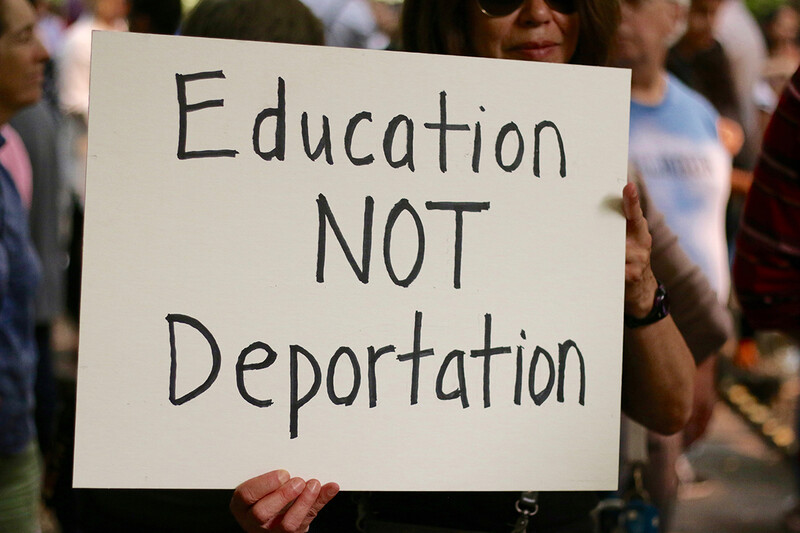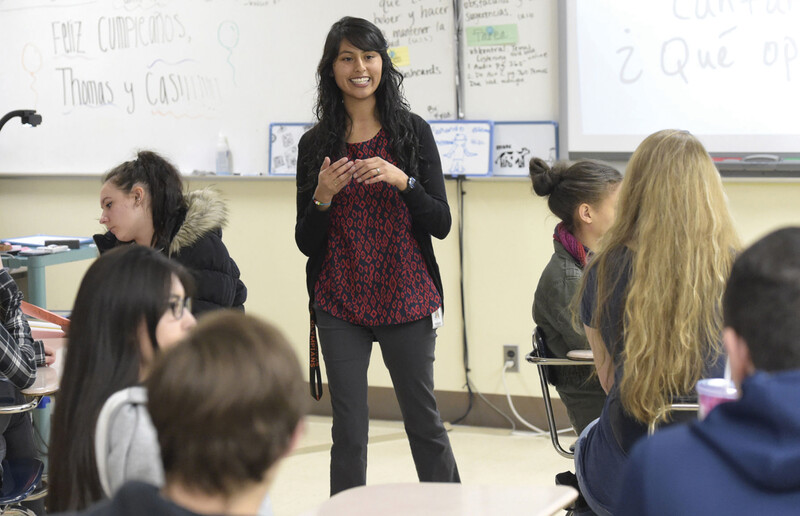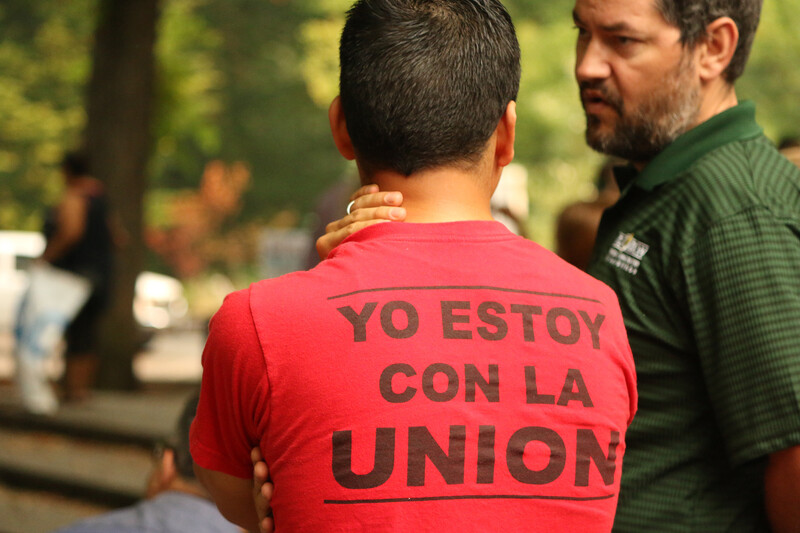Imagine crossing the Mexican border into the United States as a baby in your mother’s arms. You grow up in America, thinking of this country as your own. You go to American schools, receive vaccinations from American doctors, learn the ABCs, eat American fast food, shoot off fireworks on the Fourth of July. This is the only home you’ve ever known.
Yet, when the time comes to assume adult responsibilities in American society – to obtain a driver’s license, to register to vote, to apply for college – you are barred from taking your place alongside your countrymen because you are not a United States citizen.
This is stark reality for about 1.2 million young people in the United States today. These individuals were brought to the United States as children by parents who did not enter the country legally. Prior to Oct. 5, 2017, these young people were eligible for DACA – Deferred Action for Childhood Arrival – a government program created in 2012 which allowed them to, among other things, legally attend school, enter the workforce and removed the threat of imminent deportation.
The Trump Administration announced the cancellation of DACA in early September, throwing the lives of hundreds of thousands of undocumented immigrants into utter disarray, including the livelihoods of more than 11,000 Oregonians, many of them teachers and students.

Diana Alvarez, a Spanish teacher at Sprague High School in Salem, is one of those educators. Alvarez, who is originally from Guanajanto, Mexico, crossed the border into the United States when she was six years old. She came here with her parents and her four siblings. She applied for DACA as soon as it was made available by the Obama administration, and has worked legally in America ever since.
Now, her future is uncertain. If Congress cannot come up with a viable solution to allow individuals previously protected through DACA to remain productive members of American society, Alvarez faces potentially drastic consequences. Once her DACA status expires next October, she will no longer be able to legally drive or work in the United States. Deportation is a very real threat.
“Several of [my students] commented on how they had no idea and admired how I was handling it with calm and peace,” she said about her students finding out about her undocumented status. “One of them also said that I couldn't lose the DACA because they didn't want me to lose my job and/or get deported; they needed me to be there for graduation. That confirmed what my principal had mentioned: my students who know me, know me as their teacher and now that they know my situation, they are also supporting me.”
Christian Calzada is an Oregon student impacted by the DACA rescission. Calzada entered the United States as a one-year-old. Today, he attends Portland Community College where he is a tireless advocate for undocumented Oregonians. He aspires to become a lawyer to use his firsthand experience to help undocumented communities and refugees.
Calzada was smack in the middle of the DACA application process when the Trump Administration announced DACA’s rescission.
To qualify for DACA, operated through the Department of Homeland Security, a young person had to be under 31 years of age as of June 15, 2012, entered the U.S. under the age of 16, and continuously resided in the United States from June 15, 2007 to the present. No felonies or significant misdemeanors could be on file.
Once a person’s DACA application was accepted, an undocumented individual was allowed to live and work in the United States without the immediate threat of deportation – however, it was clear that DACA status could be (and since has been) rescinded at any time, and deferred status was only granted for a two-year interval at the steep price of $495. This does not include lawyer fees incurred by the vast majority of applicants who desired legal assistance to navigate the application process.
Undocumented individuals considered DACA a “temporary bandaid to cover up a cut that keeps on bleeding,” says Calzada, and as with any government process involving paperwork, navigating the application process is anything but easy.
“There’s a lot of paperwork,” Calzada says. “You have to prove that you’ve been here since 2007 constantly. I had to find documents from every month: school grades, vaccinations I had received, church files, anything, so there’s a lot of digging going on.”
DACA status remained a bandaid for this specific subset of undocumented individuals while Congress worked to pass the DREAM (Development, Relief, and Education for Alien Minors) Act, legislation that, if enacted, would provide DACA-eligible individuals a pathway to permanent American citizenship. For this reason, DACA recipients are often referred to as DREAMers.
The Dream Act was first introduced to Congress in 2001 and has been reintroduced several times. Despite bipartisan support, it has still failed to pass. Oregon Senators Ron Wyden and Jeff Merkley, who hosted a roundtable with some of Oregon’s undocumented students and allies in early October, both plan to push ferociously for the Act’s latest iteration to pass through the Senate by the end of the year, they said, referring to the young people gathered around them as “Oregon’s Dream Team.”
“The current position our Dreamers have been put in – more than 11,000 in Oregon – is heartless and it’s stupid,” Merkley said to the crowd.
Oregon’s DACA recipients agree.
“We’re angry and we’re exhausted,” said roundtable participant Liliana Luna, coordinator of Portland Community College’s Rock Creek Campus Multicultural Center. "This is not the first time that we are sharing our stories. I’m exhausted of sharing my story. While I appreciate the time, I want to work. I want to get this done. We have shared our stories so many times but we have not been heard.”
“The current position our Dreamers have been put in – more than 11,000 in Oregon – is heartless and it’s stupid.”
— Senator Jeff Merkley
Fear, Anger, Exhaustion
Oregon DACA recipients echo Luna’s sentiments, and many add fear to the list. Undocumented individuals live in the constant turmoil of uncertainty, a realm of limbo that doesn’t show signs of relenting anytime soon.
The fear of deportation is a tangible one for all of Oregon’s undocumented individuals. When ICE – Immigration and Customs Enforcement – is mentioned, the air chills. While young people with DACA status are protected until their two-year period of deferment expires, their families are not.
Many of today’s DACA recipients refer to their parents as the “original Dreamers,” individuals who risked everything to give their children a better future.
Calzada, whose family is originally from Mexico City, worries that while Dreamers are often seen as blameless, their parents are vilified for making a decision that virtually any parent would make – the decision to risk everything for the possibility of a brighter future for their children.
“The lack of opportunity that was there (in Mexico City) was not something that my parents could do anymore. They understood they had to feed their kids. … I can imagine that any parent is willing to risk it all for their kids,” he said.
Even if the Dream Act is passed and DACA recipients are provided a circuitous path to American citizenship, their parents will not, meaning that fear of deportation never goes away. Roundtable participants urged Merkley and Wyden to throw their support behind legislation that would also offer a pathway to citizenship for their parents.
And, with the Administration’s rescission of DACA and tougher stance on illegal immigration, current recipients worry that their personal information – information they provided to Homeland Security on good faith as part of their DACA application – could actually make them an easy target for job loss and even deportation. Many Oregon students would not speak on the record about this issue due to this very fear.
“My DACA expiration date is a very real threat,” explained Leo Reyes, cofounder of the Oregon DACA Coalition based in Salem. “At that point, I will lose my job. I will lose my ability to drive. Therefore I will probably lose my ability to pay my rent, to make my car payment.”
The tone of the conversation shifts from fear to anger when immigration politics are raised and neither democrats nor republicans are off the hook. Dreamers are tired of being used as political pawns as the two parties spar for an upper hand.
“It’s sad that our allies talk about Dreamers, DACA recipients, but don’t talk about our parents,” Calzada said to the two Oregon senators during the roundtable discussion. Others added that they are tired of being tokenized on the partisan battlefield.

Diana Alvarez finds joy in being a part of her students life journey at Sprague High School in Salem.
Impact on the Education Industry
Among the more than a million people potentially impacted by a stroke of the Trump Administration’s pen, many are teachers and students who face job loss and deportation.
According to the Migration Policy Institute, 365,000 DACA-eligible young people are high school students and another 241,000 are college students. An additional 20,000 are teachers.
While Alvarez’s students have indicated they will fight for her, the expiration of her DACA protections next October looms, and students may be no match against the federal government. Like any quality educator, Alvarez just wants to teach. Her plate is already overfull with the normal duties of the teaching profession, a feeling all teachers know well. Now, on top of worries about test scores, a mountain of grading, Common Core, and whether her students go home to a safe place each night, Alvarez adds concerns over her immigration status to the list.

Diana Alvarez' DACA status allowed her to pursue her dream of becoming a high school teacher.
She says she became a teacher because she loves spending time with kids, a realization that came from a fellow camp counselor one summer.
Throughout high school, Alvarez volunteered as a counselor at a local faith-based camp.
“I didn’t work up until I had my DACA documents, because I didn’t want to break any more laws so I volunteered at camps in the summer,” says Alvarez, explaining that DACA came at a really good time for her because she had just graduated high school.
One summer, a coworker suggested that she consider a career in teaching, a novel idea for Alvarez, who was then considering a career in engineering.
“The more I worked with kids in the summer, the more I realized I really liked working with students,” she says.
Alvarez remembers clearly the moment she was first teaching in her very own classroom, describing the realization that she would now be paid to do something she loves as “incredible.”
“That’s what I tell students,” she says. “I get to be a part of your lives and hopefully give you some good tools and be a good influence and impact your life for good.”
The rescission of DACA creates a snowball effect for Oregon students and educators, a snowball that has both ethical and economic repercussions.
Students enrolled in Oregon community colleges and universities will still be able to attend school, but they can expect to see their education costs increase exponentially as their DACA status enabled them to pay in-state tuition. They are not eligible for federal financial aid programs.
And, their ability to legally work in the United States will be revoked, meaning their ability to pay for a suddenly more expensive education will be a great barrier. Many students, some primary wage-earners for their immediate and extended families, will drop out of school.
Economically, this will impact the Oregon college and university system. According to the Oregon Attorney General’s office, 5,000 of the state’s DACA grantees are enrolled in post-high school institutions.
“These are young people who contribute so much,” says Oregon Attorney General Ellen Rosenblum. “All you have to do is meet them and you’re just won over by their humanity, their desire to be like everyone else.”
The domino effect continues, Rosenblum says, when you consider that many DACA recipients have children of their own in Oregon’s public schools. These children, American citizens by birthright, do not face deportation while some of their parents do. In a very real way, rescinding DACA threatens to break families apart.

Many DACA recipients spoke about how they grew up in an American school system that explicitly teaches them they reside in the land of opportunity, a country where, if you work hard enough, you can achieve anything. They are told that their education is a right, not a privilege, a sentiment echoed by Oregon’s public officials.
“The Dreamers are fully part of our community, raised here and building the foundation for their life here, and to be able to thrive you have to have access to education, and that’s true for any child growing up here,” says Oregon Senator Merkley.
Dreamers do not necessarily feel as if this narrative applies to them.
“You grow up with this idea of equality, of equal opportunity, and the idea that we firmly and strongly believe that if you work hard enough that you can succeed and can acquire a better quality of life. Then you start to realize that those things aren’t true for you,” Reyes says.
The potential impact of the loss of DACA continues if you consider the cost of replacing the employees who will lose their jobs. The National Commission on Teaching and America’s Future places the cost of replacing a single teacher at $17,872. And DACA grantees aren’t just teachers, they work in every industry imaginable, including the public sector. Re-filling government positions threatens to cost taxpayers and local government entities like school districts millions of dollars nationwide.
“These people contribute to an educated and talented workforce here in Oregon,” says Rosenblum.
A day after the Trump Administration announced the end of DACA, Oregon became one of 15 states, along with their attorneys general, to jointly file suit against the president and his administration. Additionally, Rosenblum says, the state has made every effort to strengthen Oregon’s sanctuary status, which means that Oregon will refuse to assist the federal government in enforcing immigration law.
While Governor Kate Brown’s office has recently made moves to strengthen Oregon’s sanctuary status, Oregon has been a sanctuary state since 1987, when the legislature passed a law blocking state police departments from using resources to proactively arrest people wanted on immigration violations.
“You grow up with this idea of equality, of equal opportunity, and the idea that we firmly and strongly believe that if you work hard enough that you can succeed and can acquire a better quality of life. Then you start to realize that those things aren’t true for you."
— Leo Reyes, Co-founder of the Oregon DACA Coalition
While officials fight back on the local, state, and federal levels, grassroots activism is strong in Oregon.
The Oregon DACA Coalition, spearheaded by Reyes, was formed the day after President Trump’s election as a proactive response to the now-President’s incendiary remarks about immigration on the campaign trail. Between the President’s Sept. 5 announcement about the end of DACA and the Oct. 5 enrollment deadline, Reyes says the coalition awarded 54 scholarships to Dreamers to cover the $495 filing fee.
Now, the coalition turns its focus toward advocating for Congress to pass legislation that protects Dreamers and offers a path to citizenship for them and their parents.
Oregon educators have a role to play, too, says Klaudia Cuevas, financial aid specialist and scholarship coordinator at Clackamas Community College.
“Talk to [undocumented] students,” she says. “Talk to them about if they considered going to college because many of them are afraid and don’t have that information available. Provide that support and guidance. Many of these students rely on those educators and allies for them to be able to navigate such a challenging education system.”
As an educator herself, Alvarez reminds everyone that, even if they don’t know a DACA recipient personally, chances are they have friends and family who do.
“Growing up in school, my teachers knew me as me and what I did and what I was about, not that I was undocumented,” she says. “Know that you have all these other people living and working around you, and you would probably think differently about this if you knew your really good friend who you play golf with is also undocumented. We’re people just like anyone else.”

